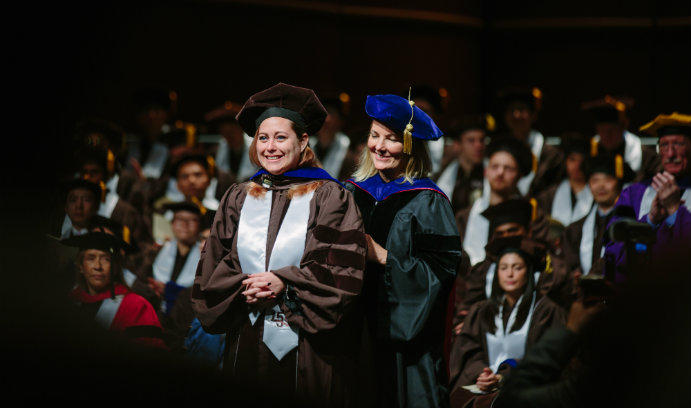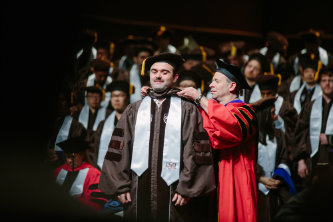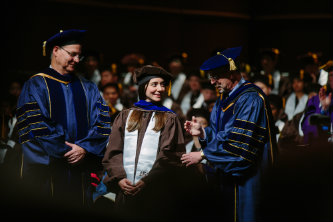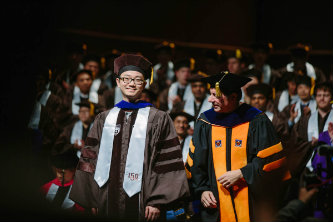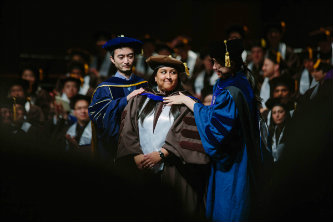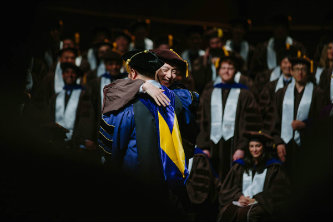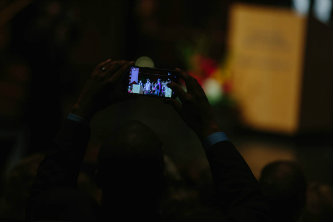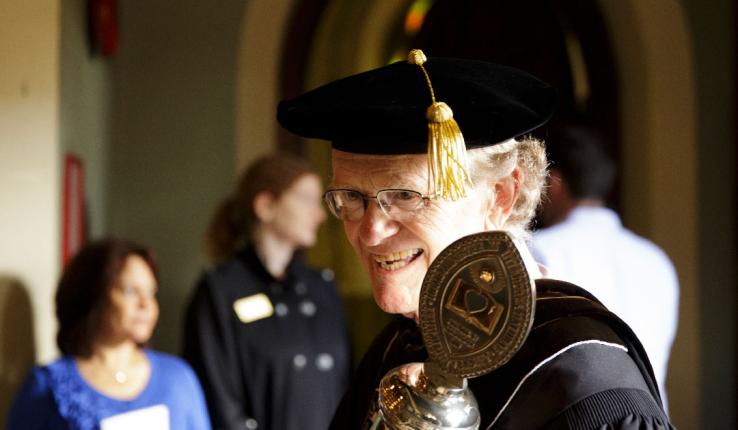Ph.D. grads urged to ‘make a difference’
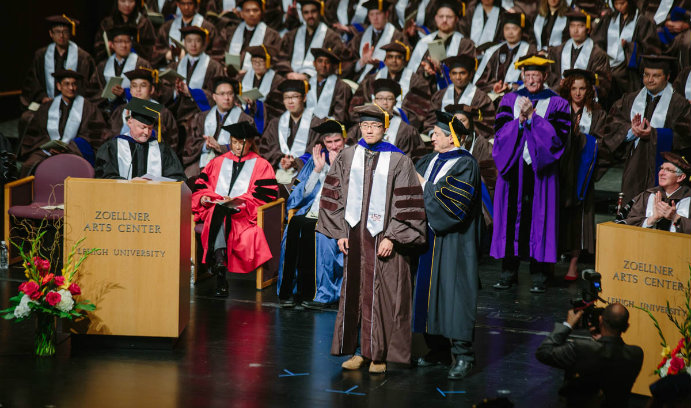
“The world needs rigorous and independent thinkers like you,” President John D. Simon told the students who were recognized Sunday for earning the highest degree in academics, a doctorate.
More than 100 graduate students were recognized Sunday for earning the highest degree in academics—a doctorate, as President John Simon urged them to “use their talents to the fullest” in following their life paths, whether in public service, education or business.
“The world needs rigorous and independent thinkers like you,” Simon said. “Take risks and find a way to make a difference. And know that we all expect something spectacular from you.”
The 75-minute Doctoral Degree Hooding Ceremony was held Sunday (May 22) in Baker Hall in the Zoellner Arts Center. As Simon congratulated the graduates on their achievements, family and friends erupted in cheers and applause. Simon also gave recognition to those family members who had supported the graduates on their journey, as well as the professors who had mentored them.
“It takes a great deal of perseverance to earn a Ph.D.,” Simon noted. “I am sure there were times when you wondered whether the sacrifices were worth it. But you hung in there and conquered whatever doubts you had.”
At the ceremony, three graduates were presented with the Elizabeth V. Stout Dissertation Award, which recognizes doctoral dissertations that were judged to have made unusually significant and original contributions in their field. The award was endowed by the late Robert Stout, former dean of the graduate school and professor emeritus of materials science and engineering, in memory of his wife.
This year’s recipients were:
- Mingkai Jiang, who received a Ph.D. in earth and environmental sciences, for “On the History and Evidence of the Colwell Index in Quantifying Environmental Predictability, and its Applications in Characterizing Precipitation Predictability in the Conterminous United States.”
- Adam Ira Biener, who received a Ph.D. in business and economics, for “The Impact of Obesity in Children and Adults on Medical Care Expenditures: A Regression Calibration Instrumental Variables Approach.”
- Shunqiang Wang, who received a Ph.D. in mechanical engineering, for “Microfluidic Devices with Engineered Micro-/Nanostructures for Cell Isolation.”
Also, David J. Fine, who was receiving a Ph.D. in English, was awarded the College of Arts and Sciences Dean’s Dissertation Award. His dissertation was titled “The True God Slays: Secularization and Ethics in the Postwar British Novel.”
Before the graduates received their individual hoods, Provost Pat Farrell explained the tradition, which dates back to 1895, and the distinct system that assigns specific meaning to the colors used in the hoods. Since the linings indicate the university or college where the degree was granted, the hoods were lined in Lehigh’s colors—brown and white. The velvet trim represents the graduates’ field of knowledge—deep blue for the doctorate of philosophy, orange for engineering, as example.
Besides the tradition in American higher education, Farrell said, the hoods “are symbolic of the work accomplished and the promise of future creative thought. It is our hope that they will also hold warm memories of your time spent at Lehigh University.”
Farrell said Lehigh believes it has an obligation to provide thoughtful solutions to the world’s challenges. “You who receive your hoods today are the intellectual leaders of tomorrow,” he said. “That is no small responsibility, but I think it is one you are well equipped to bear.”
He pointed to three attributes he said the graduates possessed—intellect, passion and perseverance. “They will serve you well in whatever arena you choose to make your mark. Be generous with your talents and your leadership, and you will do great things.”
The candidates were presented by the deans of Lehigh’s four colleges: Donald E. Hall, Herbert J. and Ann L. Siegel Dean of the College of Arts and Sciences; Georgette Phillips, Kevin L. and Lisa A. Clayton Dean of the College of Business and Economics; Gary M. Sasso, dean of the College of Education and John Coulter, and John Coulter, interim dean of the P.C. Rossin College of Engineering and Applied Science.
Posted on:


